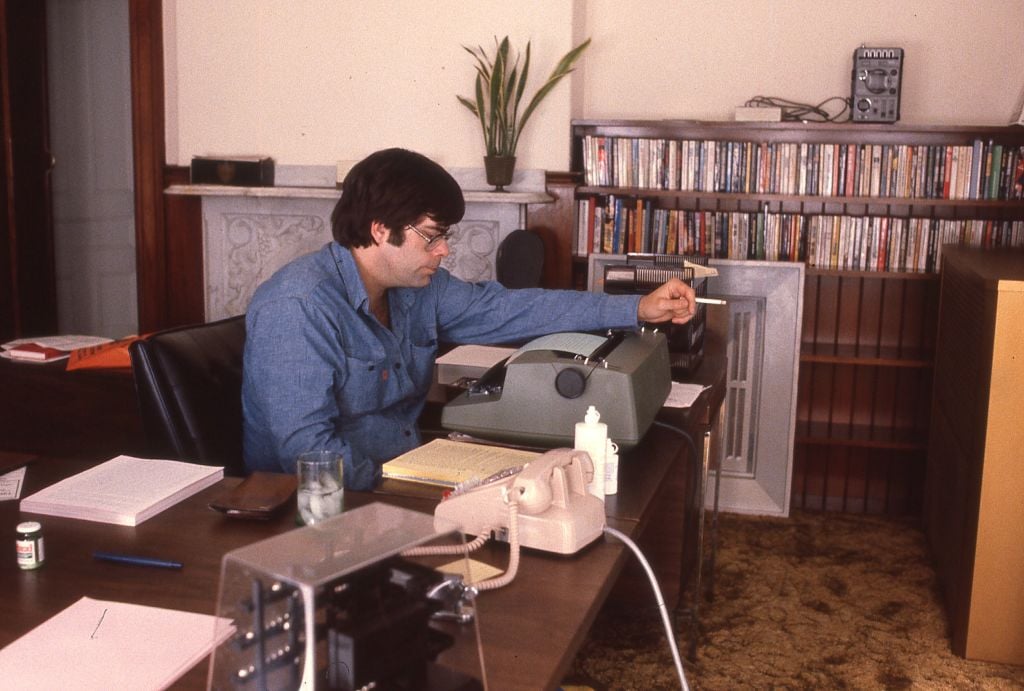Stephen King and John Grisham Disagree On How to Write Books
Stephen King and John Grisham, two of the most prolific authors, had an online conversation on April 29. It was a fundraiser for BINC, the Bookseller Industry Charitable Foundation. Donations go towards medical expenses, rent demands and other financial emergencies, since they have to close their physical stores during the coronavirus (COVID-19) pandemic.

King and Grisham write different kinds of books. King writes predominantly horror and Grisham is most famous for his legal thrillers, though he’s written Christmas and sports stories, and a legal series for kids. Both have seen many of their novels turned into hit movies. When they began to discuss their process, they come at the blank page from different angles. Read what they said and watch the full hour long video from King’s YouTube Channel below.
Both Stephen King and John Grisham write 1,000 words per day
One thing King and Grisham agree on is a daily regimen. King used to write 2,000 words per day but he’s taken it easier on himself.
“Not anymore,” King said. “If I do 1,000 a day I’m happy.”
His new 1,000 word per day pace is in line with Grisham’s.

“1000 a day is a good day for me,” Grisham said. ”That’s three or four hours and after you do that, your brain’s mush and you’ve got to take a break.”
John Grisham outlines his entire story before writing
Perhaps it’s a lawyer’s mind at work. Grisham is a firm believer in outlining.
“I believe in outlining,” Grisham said. “One of my rules is don’t write the first scene until you know the last scene. I met John Irving last year in Toronto. John Irving says he writes the last sentence before he writes the first sentence. I’m not that smart, but I know where a book is going when I start.”
Grisham added that he worries if he doesn’t outline, he might reach a point in the story where he’s stumped.

“I don’t start until I have the complete story, so I’ve never had a situation after writing 40-something books of just hitting a dead end and not knowing where you’re going,” Grisham said. Writers are famous for doing that.”
King razzed Grisham for his outlining practice.
“Did you used to unwrap your presents on Christmas Eve?” King joked. “Did you used to look in the closet and see what you got?”
Stephen King doesn’t know how his books end but he’s not totally making them up as he goes along
King would have you believe he’s making his stories up as he goes along, but that’s not entirely true. While he doesn’t know how they end ahead of time, he has some broad ideas.
“I usually have an idea of what I’d like to do,” King said. “I have a situation. The characters who come on stage one by one and I have certain incidents that I feel like I have to write, so I pull towards those incidents one after the other. A lot of times I have an idea of how the book is going to end, but it rarely turns out the way that I thought it would. I think that a lot of times, some of the twists have surprised readers because I didn’t know they were coming either.”
The way King puts it, he plans ahead for the short term, but doesn’t worry about the big picture.
“I want to know what I’m going to do tomorrow,” King said. “I don’t care about next week.”
Stephen King has finally embraced the word processor
King began writing in the ‘70s when computers were not as common as they are today. Writers would often hear horror stories about people losing all of their work due to a computer glitch.
“I didn’t trust the medium,” King said. “I’m kind of a luddite, whatever you want to call it, old crank. Because I didn’t trust the computer, I always thought I was going to lose stuff, it was going to go to data heaven. So what I would do is I would write that day’s work and I would print it out.”
Now that there is ample backup, King embraces the advantages of writing novels on a computer.

“I don’t do that anymore and I love it because everything stays liquid,” King said. “So I’ve got a character in this story where I thought to myself, ‘She’s okay. She’s 21 or 22 but I want to make her younger.’ So I didn’t have to rewrite all those pages or reprint those pages. I could just go back in the computer and make her a little bit younger.”
John Grisham stays offline, Stephen King gets distracted
One disadvantage of the computer, King admits, is that he’s often distracted by e-mails and other notifications.
“The thing is, I don’t know how to turn that stuff off,” King said. “When that happens, I think to myself maybe I ought to look and see what this person wants.”
It certainly hasn’t seemed to slow him down. Grisham, on the other hand, keeps his writing computer offline.
“I work on a computer but it’s not online,” Grisham said. “I’ve read stories of writers who get hacked and their stuff gets stolen so I’m terrified of writing online. It’s all offline in my writing space. In the house I’ve got laptop that I do all my correspondence on. Then when I finish the book, I still print every day’s work as my backup. On occasion, I’ll back up the whole thing on a thumb drive but I’m terrified of working online.”


